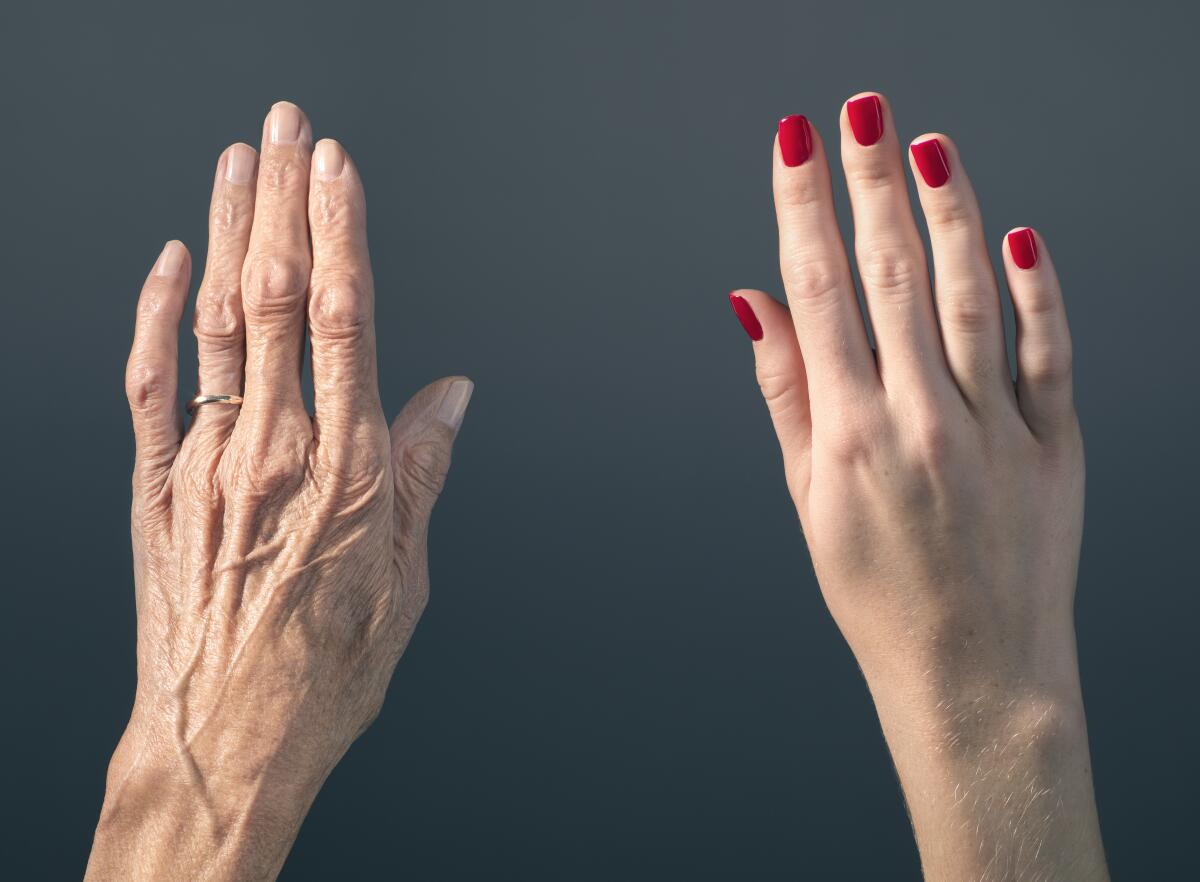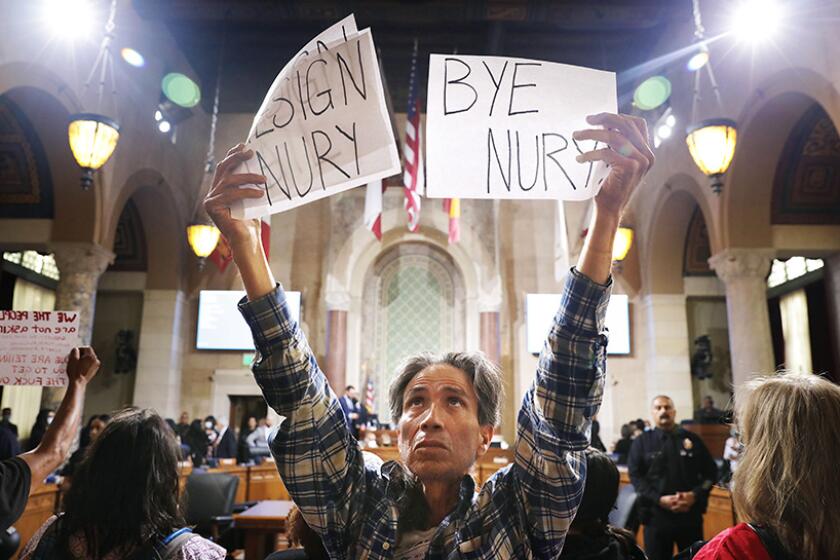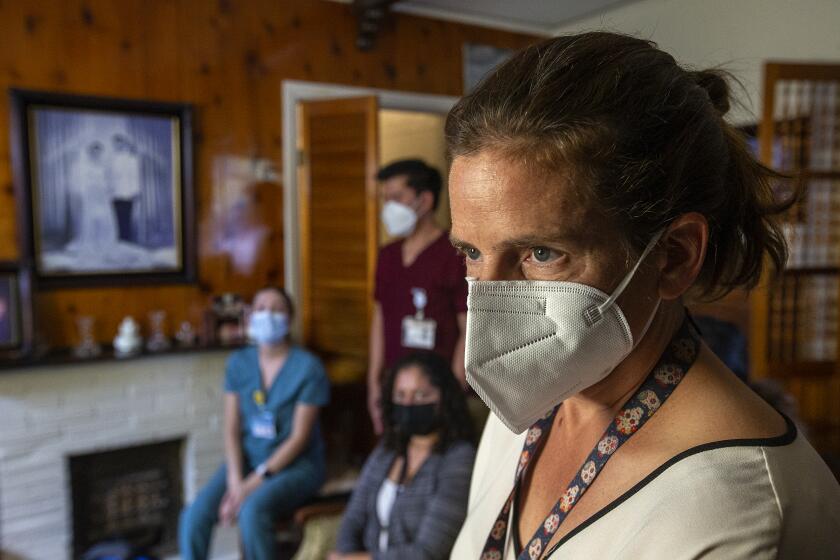Column: What’s so great about living to 100?

Do I want to live to be 100? Do you?
I thought I did. I mean, why not? I envisioned a relaxing old age of books, movies, great-grandchildren, gossiping with the other elderly folks. The longer we can put off death, the better, I figured.
But these days, I wonder.
When I was a kid such a long life was unimaginable. I’d never met anyone who’d lived to 100, or into their 90s, for that matter. In the 1960s, extreme old age seemed reserved for strange and exceptional people living on unfamiliar diets on faraway Pacific islands.
Opinion Columnist
Nicholas Goldberg
Nicholas Goldberg served 11 years as editor of the editorial page and is a former editor of the Op-Ed page and Sunday Opinion section.
But times have changed. Life expectancy grew enormously during the 20th century thanks to all kinds of advances, from antibiotics and vaccines to better diets and exercise. It didn’t get to 100, of course; in 2021, U.S. life expectancy was 76.1 years. (And less if you’re poor or Black or male or, God forbid, a smoker.)
But there are a lot more 100-year-olds than there used to be. By one government estimate, there were some 2,300 centenarians living in the U.S. in 1950. Today there are more than 97,000, according to the Census Bureau. More than three-quarters of them are women.
But do you or I really want to be among them?
Of course the question behind the question is, if we’re going to live to 100, what will be our quality of life? And a recent survey in the UK suggests that people are well aware of that caveat.
The poll, which I saw reported in the Financial Times, found that only 35% of people wanted to live to 100. About half said no thanks; 56% feared their quality of life would be “poor” by then.
Interestingly, older respondents were less likely than younger ones to want to hit the 100-year mark.
That got me concerned. (For the record, I’m 64.)
Some leaks are justified and some are not. We ought to keep that in mind before we punish the perpetrators.
I mean, OK, I’ve known all along 100 wouldn’t be like 25. Now, though, I’m tempering my hopes with some questions: Will I be able to dress myself, feed myself and get to the bathroom? Will I recognize my children? Will I be able to read a book? Leave the house and see the sunset? Will I have enough money? Will I be intolerably lonely?
I wouldn’t want to keep going on if I were in the grips of serious dementia or chronic pain or if I were too much of a burden on others.
Not that it necessarily matters what we want. Only a small portion of whether we get to 100 is up to us.
According to Dr. Thomas T. Perls, a professor at the Boston University Chobanian & Avedisian School of Medicine who directs the New England Centenarian Study, getting to age 90 is about 70% to 75% due to health-related behaviors and the environment in which you live and the other 20% to 25% is due to your genes. But as you reach 100 and older, it becomes less about luck, behavior and environment and more about genetics.
Interesting to know. Especially since we’ve been obsessed for so long as a species with what we should do or not do to prolong our lives. Mostly we’ve tried to convince ourselves that our bad behaviors won’t pose obstacles to longevity.
As far back as 1871, the New York Times reported gleefully on 106-year-old Captain Lahrbush: “One of his most striking peculiarities is his fondness for opium, which he has used every day for several years,” the paper noted.
Too often in the fight to protect civilians around the world against atrocities and genocide, the United States does not do enough. Why is that?
Or this, in an 1881 story about “old Mr. Bogert” turning 100: “He says he never took any medicine in his life and to this he ascribes his good health, as he was never ill but one day, and he is sure he would have died years ago if he had been in the habit of taking medicine.”
A Los Angeles Times story in 1907 reported on a book by a French doctor who concluded that actually, yes, it is possible to smoke your whole life or drink 40 cups of coffee a day or get drunk every night — and still live to 100.
“With the eliminative organs working property, the poisons merely travel the system, according to the theory of this book,” wrote The Times.
These days, sadly, the experts are not as forgiving. Never smoke, they say. Get exercise. Cut back on red meat. Get down to a healthy weight.
Where’s the fun in that?
Today, according to Perls, more than one in every 5,000 people is 100 years old or older, but only one in 250,000 is 105 or older. And only one in every 5 million is 110 or older. But longer life is coming! According to the Stanford Center on Longevity, as many as half of today’s 5-year-olds can expect to live to be 100.
A study reported in Scientific American last year, however, suggested a hard limit to the human lifespan of 120 to 150 years even if everything else goes well. Longevity, it suggested, may have a ceiling.
Hospitalizations among those 70 and older have surpassed the summer peak. Coronavirus cases for all age groups are up nearly 50% in just one week.
For myself, I’m still withholding judgment about what I want. My mother died at 79 and as far as I’m concerned, she lived several years too long. She had Alzheimer’s and spent her last years in institutions, angry, sad, detached, uncomprehending.
On the other hand, my father is turning 91, and his life seems joy-filled. He’s slowed down, but he’s surrounded by caring family members, loves to talk politics and can comfortably read on the couch. (He’s currently plowing through David McCullough’s 1,100-plus page biography of Harry Truman.) He wakes every day in good spirits.
I recently heard “Young at Heart” wafting through a shopping mall.
“And if you should survive to a hundred and five,” sang Sinatra, “look at all you’ll derive out of bein’ alive.”
Maybe so. Hope so.
More to Read
A cure for the common opinion
Get thought-provoking perspectives with our weekly newsletter.
You may occasionally receive promotional content from the Los Angeles Times.















